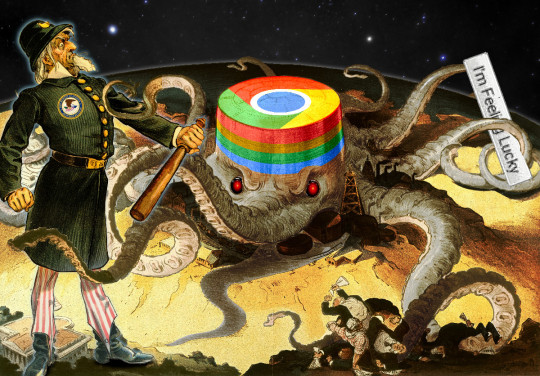#For Google Ads
Explore tagged Tumblr posts
Text

suck, and i cannot stress this enough, my cock to the fucking base
122K notes
·
View notes
Text
PLEASE do yourself a favour and check out this wikipedia-styled template for google drive, made by @ Rukidut on twitter

I decided to try to sort my ideas and whats canon regarding my ocs with this and ITS PERFECT. IT ALL FEELS SO CONRETE. and i sure as hell AM Going to continue to use this with every single OC I have until google drives is set ablaze- Just!!!!!!!!
Also; link directly to the doc, just copy the file and you have your own lil template!!!!
#ocs#original characters#wikipedia#google drive#google drive template#oc reference sheet#oc reference#shout out#Tags possibly to be added
50K notes
·
View notes
Text

Google finally did it. Is it time to switch to Firefox? I believe users should be in control of what they can install and use on their desktop or laptop. There's uBlock Origin Lite, which replaces the original uBlock Origin for Chrome and similar browsers. Give it a try.
10K notes
·
View notes
Text









NOSFERATU (1922) dir. F. W. Murnau (x)

#nosferatu#nosferatu 1922#filmgifs#horroredit#nosferatuedit#filmedit#dailyhorrorgifs#classicfilmblr#classicfilmsource#dailyworldcinema#this man does NOT know where he is going#count orlok you would have loved google maps#added the reductress headline as a joke but why does it fit so well#*gifs
3K notes
·
View notes
Text
#How_can_we_grow_our_Business?#⭐⭐⭐⭐⭐#To grow your business with Google Ads and Facebook Ads#start by defining clear goals and target audiences for each platform. Create compelling ad campaigns with eye-catching visuals and persuasi#For Google Ads#conduct keyword research and bid strategically to maximize your ROI. Use ad extensions and negative keywords to refine your targeting. Cont#On Facebook Ads#leverage the platform's extensive targeting options to reach your ideal customers. Create engaging content that encourages interaction and#such as carousel ads#video ads#and sponsored posts.#Consistent monitoring#adjustment#and data-driven decision-making are key. Track your ad performance using analytics tools and adapt your strategies based on what works best#DigitalMarketing#OnlineMarketing#SalesBoost#MarketingTips#BusinessGrowth#DigitalStrategy#instagram#socialmedia#marketing#advertising#brand#business#research#ecommerce#facebook#engagement
1 note
·
View note
Text

if you write fic and haven’t ditched google docs for ellipsus yet, you really should
#while google is scraping your docs to feed their ai#and adding morality clauses to their terms of use#they’re out here giving me hope#it’s a simple thing#but fuck does it mean a lot#ellipsus#ao3
1K notes
·
View notes
Text

Summer vacation, 4am.
Tons of easter eggs in this one! Click the image to find them (and for better quality ofc)
Close ups and process shots under the cut, description in alt text







#it's all post canon of course#btw you can't see but the paper on the floor has an episode description written on it#it's ep 53.5 which I made up. what's the plot you ask? pure fluff and highschool shenanigans. these kids deserve it#check out Taylor's Matryoshka shirt and Linc's Garfield pullover :3#also the building on the right may or may not be a Sonic's distribution center#I love being not-usamerican and just going on google streetview to research the San Dimas area.. looking at parking lots going ''ah! I see'#also#this one took me literal months... the cart's perspective was so hard to get right#so I just sat and stared at it for a couple minutes - added a couple of lines and erased some others - and then closed off my sketchbook lo#dndads#dungeons and daddies#dndaddies#dndads s2#scary marlowe#lincon li wilson#link li wilson#normal oak#normally oak swallows garcia#normal oak garcia#taylor swift dungeons and daddies#taylor swift dndads#taylor swift not that one#my art#yuviur
1K notes
·
View notes
Text
The Google antitrust remedy should extinguish surveillance, not democratize it

I'm coming to DEFCON! On FRIDAY (Aug 9), I'm emceeing the EFF POKER TOURNAMENT (noon at the Horseshoe Poker Room), and appearing on the BRICKED AND ABANDONED panel (5PM, LVCC - L1 - HW1–11–01). On SATURDAY (Aug 10), I'm giving a keynote called "DISENSHITTIFY OR DIE! How hackers can seize the means of computation and build a new, good internet that is hardened against our asshole bosses' insatiable horniness for enshittification" (noon, LVCC - L1 - HW1–11–01).

If you are even slightly plugged into the doings and goings on in this tired old world of ours, then you have heard that Google has lost its antitrust case against the DOJ Antitrust Division, and is now an official, no-foolin', convicted monopolist.
This is huge. Epochal. The DOJ, under the leadership of the fire-breathing trustbuster Jonathan Kanter, has done something that was inconceivable four years ago when he was appointed. On Kanter's first day on the job as head of the Antitrust Division, he addressed his gathered prosecutors and asked them to raise their hands if they'd never lost a case.
It was a canny trap. As the proud, victorious DOJ lawyers thrust their arms into the air, Kanter quoted James Comey, who did the same thing on his first day on the job as DA for the Southern District of New York: "You people are the chickenshit club." A federal prosecutor who never loses a case is a prosecutor who only goes after easy targets, and leave the worst offenders (who can mount a serious defense) unscathed.
Under Kanter, the Antitrust Division has been anything but a Chickenshit Club. They've gone after the biggest game, the hardest targets, and with Google, they bagged the hardest target of all.
Again: this is huge:
https://www.thebignewsletter.com/p/boom-judge-rules-google-is-a-monopolist
But also: this is just the start.
Now that Google is convicted, the court needs to decide what to do about it. Courts have lots of leeway when it comes to addressing a finding of lawbreaking. They can impose "conduct remedies" ("don't do that anymore"). These are generally considered weaksauce, because they're hard to administer. When you tell a company like Google to stop doing something, you need to expend a lot of energy to make sure they're following orders. Conduct remedies are as much a punishment for the government (which has to spend millions closely observing the company to ensure compliance) as they are for the firms involved.
But the court could also order Google to stop doing certain things. For example, since the ruling finds that Google illegally maintained its monopoly by paying other entities – Apple, Mozilla, Samsung, AT&T, etc – to be the default search, the court could order them to stop doing that. At the very least, that's a lot easier to monitor.
The big guns, though are the structural remedies. The court could order Google to sell off parts of its business, like its ad-tech stack, through which it represents both buyers and sellers in a marketplace it owns, and with whom it competes as a buyer and a seller. There's already proposed, bipartisan legislation to do this (how bipartisan? Its two main co-sponsors are Ted Cruz and Elizabeth Warren!):
https://pluralistic.net/2023/05/25/structural-separation/#america-act
All of these things, and more, are on the table:
https://www.wired.com/story/google-search-monopoly-judge-amit-mehta-options/
We'll get a better sense of what the judge is likely to order in the fall, but the case could drag out for quite some time, as Google appeals the verdict, then tries for the Supreme Court, then appeals the remedy, and so on and so on. Dragging things out in the hopes of running out the clock is a time-honored tradition in tech antitrust. IBM dragged out its antitrust appeals for 12 years, from 1970 to 1982 (they called it "Antitrust's Vietnam"). This is an expensive gambit: IBM outspent the entire DOJ Antitrust Division for 12 consecutive years, hiring more lawyers to fight the DOJ than the DOJ employed to run all of its antitrust enforcement, nationwide. But it worked. IBM hung in there until Reagan got elected and ordered his AG to drop the case.
This is the same trick Microsoft pulled in the nineties. The case went to trial in 1998, and Microsoft lost in 1999. They appealed, and dragged out the proceedings until GW Bush stole the presidency in 2000 and dropped the case in 2001.
I am 100% certain that there are lawyers at Google thinking about this: "OK, say we put a few hundred million behind Trump-affiliated PACs, wait until he's president, have a little meeting with Attorney General Andrew Tate, and convince him to drop the case. Worked for IBM, worked for Microsoft, it'll work for us. And it'll be a bargain."
That's one way things could go wrong, but it's hardly the only way. In his ruling, Judge Mehta rejected the DOJ's argument that in illegally creating and maintaining its monopoly, Google harmed its users' privacy by foreclosing on the possibility of a rival that didn't rely on commercial surveillance.
The judge repeats some of the most cherished and absurd canards of the marketing industry, like the idea that people actually like advertisements, provided that they're relevant, so spying on people is actually doing them a favor by making it easier to target the right ads to them.
First of all, this is just obvious self-serving rubbish that the advertising industry has been repeating since the days when it was waging a massive campaign against the TV remote on the grounds that people would "steal" TV by changing the channel when the ads came on. If "relevant" advertising was so great, then no one would reach for the remote – or better still, they'd change the channel when the show came back on, looking for more ads. People don't like advertising. And they hate "relevant" advertising that targets their private behaviors and views. They find it creepy.
Remember when Apple offered users a one-click opt-out from Facebook spying, the most sophisticated commercial surveillance system in human history, whose entire purpose was to deliver "relevant" advertising? More than 96% of Apple's customers opted out of surveillance. Even the most Hayek-pilled economist has to admit that this is a a hell of a "revealed preference." People don't want "relevant" advertising. Period.
The judge's credulous repetition of this obvious nonsense is doubly disturbing in light of the nature of the monopoly charge against Google – that the company had monopolized the advertising market.
Don't get me wrong: Google has monopolized the advertising market. They operate a "full stack" ad-tech shop. By controlling the tools that sellers and buyers use, and the marketplace where they use them, Google steals billions from advertisers and publishers. And that's before you factor in Jedi Blue, the illegal collusive arrangement the company has with Facebook, by which they carved up the market to increase their profits, gouge advertisers, starve publishers, and keep out smaller rivals:
https://en.wikipedia.org/wiki/Jedi_Blue
One effect of Google's monopoly power is a global privacy crisis. In regions with strong privacy laws (like the EU), Google uses flags of convenience (looking at you, Ireland) to break the law with impunity:
https://pluralistic.net/2023/05/15/finnegans-snooze/#dirty-old-town
In the rest of the world, Google works with other members of the surveillance cartel to prevent the passage of privacy laws. That's why the USA hasn't had a new federal privacy law since 1988, when Congress acted to ban video-store clerks from telling newspaper reporters about the VHS cassettes you took home:
https://en.wikipedia.org/wiki/Video_Privacy_Protection_Act
The lack of privacy law and privacy enforcement means that Google can inflict untold privacy harms on billions of people around the world. Everything we do, everywhere we go online and offline, every relationship we have, everything we buy and say and do – it's all collected and stored and mined and used against us. The immediate harm here is the haunting sense that you are always under observation, a violation of your fundamental human rights that prevents you from ever being your authentic self:
https://www.theguardian.com/technology/blog/2013/jun/14/nsa-prism
The harms of surveillance aren't merely spiritual and psychological – they're material and immediate. The commercial surveillance industry provides the raw feedstock for a parade of horribles, from stalkers and bounty hunters turning up on their targets' front doors to cops rounding up demonstrators with location data from their phones to identity thieves tricking their marks by using leaked or purchased private information as convincers:
https://pluralistic.net/2023/12/06/privacy-first/#but-not-just-privacy
The problem with Google's monopolization of the surveillance business model is that they're spying on us. But for a certain kind of competition wonk, the problem is that Google is monopolizing the violation of our human rights, and we need to use competition law to "democratize" commercial surveillance.
This is deeply perverse, but it represents a central split in competition theory. Some trustbusters fetishize competition for its own sake, on the theory that it makes companies better and more efficient. But there are some things we don't want companies to be better at, like violating our human rights. We want to ban human rights violations, not improve them.
For other trustbusters – like me – the point of competition enforcement isn't merely to make companies offer better products, it's to make companies small enough to hold account through the enforcement of democratic laws. I want to break – and break up – Google because I want to end its ability to bigfoot privacy law so that we can finally root out the cancer of commercial surveillance. I don't want to make Google smaller so that other surveillance companies can get in on the game.
There is a real danger that this could emerge from this decision, and that's a danger we need to guard against. Last month, Google shocked the technical world by announcing that it would not follow through on its years-long promise to kill third-party cookies, one of the most pernicious and dangerous tools of commercial surveillance. The reason for this volte-face appears to be concern that the EU would view killing third-party cookies as anticompetitive, since Google intended to maintain commercial surveillance using its Orwellian "Privacy Sandbox" technology in Chrome, with the effect that everyone except Google would find it harder to spy on us as we used the internet:
https://www.thebignewsletter.com/p/googles-trail-of-crumbs
It's true! This is anticompetitive. But the answer isn't to preserve the universal power of tech companies large and small to violate our human rights – it's to ban everyone, especially Google, from spying on us!
This current in competition law is still on the fringe, but the Google case – which finds the company illegally dominating surveillance advertising, but rejects the idea that surveillance is itself a harm – offers an opportunity for this bad idea to go from the fringe to the center.
If that happens, look out.
Take "attribution," an obscure bit of ad-tech jargon disguising a jaw-droppingly terrible practice. "Attribution" is when an ad-tech company shows you an ad, and then follows you everywhere you go, monitoring everything you do, to determine whether the ad convinced you to buy something. I mean that literally: they're combining location data generated by your phone and captured by Bluetooth and wifi receivers with data from your credit card to follow you everywhere and log everything, so that they can prove to a merchant that you bought something.
This is unspeakably grotesque. It should be illegal. In many parts of the world, it is illegal, but it is so lucrative that monopolists like Google can buy off the enforcers and get away with it. What's more, only the very largest corporations have the resources to surveil you so closely and invasively that they can perform this "service."
But again, some competition wonks look at this situation and say, "Well, that's not right, we need to make sure that everyone can do attribution." This was a (completely mad) premise in the (otherwise very good) 2020 Competition and Markets Authority market-study on "Online platforms and digital advertising":
https://assets.publishing.service.gov.uk/media/5fa557668fa8f5788db46efc/Final_report_Digital_ALT_TEXT.pdf
This (again, otherwise sensible) document veers completely off the rails whenever the subject of attribution comes up. At one point, the authors propose that the law should allow corporations to spy on people who opt out of commercial surveillance, provided that this spying is undertaken for the sole purpose of attribution.
But it gets even worse: by the end of the document, the authors propose a "user ID intervention" to give every Briton a permanent, government-issued advertising identifier to make it easier for smaller companies to do attribution.
Look, I understand why advertisers like attribution and are willing to preferentially take their business to companies that can perform it. But the fact that merchants want to be able to peer into every corner of our lives to figure out how well their ads are performing is no basis for permitting them to do so – much less intervening in the market to make it even easier so more commercial snoops can get their noses in our business!
This is an idea that keeps popping up, like in this editorial by a UK lawyer, where he proposes fixing "Google's dominance of online advertising" by making it possible for everyone to track us using the commercial surveillance identifiers created and monopolized by the ad-tech duopoly and the mobile tech duopoly:
https://www.thesling.org/what-to-do-about-googles-dominance-of-online-advertising/
Those companies are doing something rotten. In dominating ads, they have stolen billions from publishers and advertisers. Then they used those billions to capture our democratic process and ensure that our human rights weren't being defended as they plundered our private data and put us in harm's way.
Advertising will adapt. The marketing bros know this is coming. They're already discussing how to live in a world where you can't measure clicks and you can't attribute actions (e.g. the world from the first advertisements up until the early 2000s):
https://sparktoro.com/blog/attribution-is-dying-clicks-are-dying-marketing-is-going-back-to-the-20th-century/
An equitable solution to Google's monopoly will not run though our right to privacy. We don't solve the Google monopoly by creating competition in surveillance. The reason to get rid of Google's monopoly is to make it easier to end surveillance.

If you'd like an essay-formatted version of this post to read or share, here's a link to it on pluralistic.net, my surveillance-free, ad-free, tracker-free blog:
https://pluralistic.net/2024/08/07/revealed-preferences/#extinguish-v-improve

Image: Cryteria (modified) https://commons.wikimedia.org/wiki/File:HAL9000.svg
CC BY 3.0 https://creativecommons.org/licenses/by/3.0/deed.en
#pluralistic#google#antitrust#monopolies#remedies#ad-tech#competition#power#doj v google#attribution
1K notes
·
View notes
Text

part 2 of this !
#added names this time :P#beatles fanart#beatles#the beatles#cynthia lennon#jane asher#pattie boyd#maureen starkey#yoko ono#linda mccartney#olivia harrison#barbara bach#bro i’ve never drawn barbara before ive had to do some real long google searches to get her right and im still not happy with it#goth gf mo and yoko always amuses me#my flatmate was working with jane asher the other day (he’s a director) and i was like ?!!????!!?!?!?#THE icon herself ??? the Diva !!!#apparently she’s very lovely :)#sorry nancy and may pang lovers the format only allowed for 8#mullet linda my beloved <3 linda in general my beloved she is so silly !!#ate some linda mccartney mozzarella burgers last week and got emotional#hall of fame 🏷️
408 notes
·
View notes
Text
Once, Babylon seemed an invincible threat. Babylon is gone now; only archaeologists remember it.
We're still here.
Once, Rome seemed an invincible threat. Rome is gone now, only tourists remember it.
We're still here.
Once, the Crusaders seemed an invincible threat. The Crusaders are gone now, only historical dramas remember them.
We're still here.
Once, scapegoating for plague seemed an invincible threat. Those who scapegoated us are gone, long forgotten, the plague slain by antibiotics.
We're still here.
Once, the Inquisition seemed an invincible threat. The Inquisition is gone now, only comedians remember them.
We're still here.
Once, the rise of exclusionary nationalism seemed an invincible threat. Those nations have risen and fallen, the political movements that forged them remembered only by historians.
We're still here.
Once, the rise of Eugenics rendering us inferior vermin seemed an invincible threat. Eugenics has fallen, only historians and the scorned remember it.
We're still here.
Once, the Tsars both White and Red seemed invincible. The Tsars of both colors are gone now, and only a pale and thinly stretched shadow remembers them.
We're still here.
Once, the third Reich of Germany seemed an invincible threat. The Third Reich is gone now, and only desperate fools remember them.
We're still here.
Now, old new dangers have risen, those same desperate fools and former friends seeking scapegoats, who together seem invincible and inescapable.
But they, as with all things, will pass, in time.
And we will still be here.
#European cultural sphere diasporic traumas#Sepharadim and Mizrahim I appologize for not adding more bits for your own particular diasporic traumas#I'm not as familiar as I'd like and didn't want to get something wrong which I probably would if I relied on Google and wikis#diaspora#jumblr#jewish
1K notes
·
View notes
Text

iqmaxxing
#drew this extremely quickly as part of a goof but i keep looking at it and finding it funny so here you all go#pokemon mystery dungeon#pmd ocs#skitty#cyndaquil#pokemon#doodlebyte#king & muse#i dont know their tag is it an ampersand or an and i dont knowww#now if any of you can FIND the post im referencing ill give you big kiss on the forehead bc where the fuck is that post#yknow the reddit screenshot abt the guy eating like 2kg of peanuts/sunflower seeds/etc? and someone says hes like 3% peanut now#and he goes 'awesome!!'#where the hell is that post. i know ive reblogged it before. my search skills fail me#also i spent longer googling the weight of an individual jellybean and doing maths than i did drawing. the 21% is inclusive of the added 3k
323 notes
·
View notes
Text


"So just how many cases have you gotten so far, Kate Bishop?" "I'll have you know that since the inaugural opening of Hawkeye Investigations, I've taken on 5 new, definitely real, definitely paid their deposits, clients." "And how many were of cheating wives and husbands?" "...Four... BUT! One of them was about a missing guinea pig. Yeah, that one was kinda weird."
#hawkeye#kate bishop#yelena belova#bishova#kate x yelena#kate bishop x yelena belova#yelena belova x kate bishop#hailee steinfeld#***#inspired by hailee's neutrogena ad#*slaps psds*#you can shove so many references in this thing#kate's a google fiend#yelena's mostly horrified at her search history#it reveals waaayy too much of kate's psyche#when kate runs her “why we should be PI besties <3” presentation is when yelena realises she's a down bad moron-sexual#and deals with it by throwing herself out the window#(kate doesn't notice because she's busy drawing her :) on her spreadsheet)
574 notes
·
View notes
Text



#ace attorney#gyakuten saiban#phoenix wright#naruhodou ryuuichi#mia fey#ayasato chihiro#phoenix is definitely the type to doodle on his notes#maybe i'm just projecting#maybe i should post the doodles on my notes here lol#art#digital art#aa#miles edgeworth#mitsurugi reiji#narumitsu#????#technically a bit ? idk man#i googled “law notes” and transcribed a bit lol#exept the rules of presenting evidence those are from the rise from the ashes court records :p#edit: added descriptions#they suck and i'm sorry
373 notes
·
View notes
Text

I love making things in Not MS Paint™
Edit: GUYS I FORGOT THE BLUE THING ON ZOOBLE'S CHEST I'M SO SORRY TTOTT
#the amazing digital circus#Tadc#tadc fanart#tadc gangle#tadc zooble#zooble tadc#gangle tadc#abstragedy#zooble x gangle#gangle x zooble#gangle the amazing digital circus#zooble the amazing digital circus#zooble fanart#the amazing digital circus gangle#the amazing digital circus zooble#gangle fanart#Google#Gangle#fanart#My art#artists on tumblr#ms paint#indie animation fanart#cw eyestrain#eyestrain#tw eyestrain#← I know nobody is gonna look down here but I added those#Nobody asked for them#But the colors seemed a bit bright#And like
348 notes
·
View notes
Text




The Substance Coralie Fargeat. 2024
Carcrash 306 Avenue Mozart, 06600 Antibes, France See in map
See in imdb
Bonus: also in this location
#coralie fargeat#the substance#demi moore#marineland#antibes#france#movie#cinema#film#location#google maps#street view#2024#carcrash#ad#yellow#palmtree#bonus
330 notes
·
View notes
Text
Ad-tech targeting is an existential threat

I'm on a 20+ city book tour for my new novel PICKS AND SHOVELS. Catch me TORONTO on SUNDAY (Feb 23) at Another Story Books, and in NYC on WEDNESDAY (26 Feb) with JOHN HODGMAN. More tour dates here.

The commercial surveillance industry is almost totally unregulated. Data brokers, ad-tech, and everyone in between – they harvest, store, analyze, sell and rent every intimate, sensitive, potentially compromising fact about your life.
Late last year, I testified at a Consumer Finance Protection Bureau hearing about a proposed new rule to kill off data brokers, who are the lynchpin of the industry:
https://pluralistic.net/2023/08/16/the-second-best-time-is-now/#the-point-of-a-system-is-what-it-does
The other witnesses were fascinating – and chilling, There was a lawyer from the AARP who explained how data-brokers would let you target ads to categories like "seniors with dementia." Then there was someone from the Pentagon, discussing how anyone could do an ad-buy targeting "people enlisted in the armed forces who have gambling problems." Sure, I thought, and you don't even need these explicit categories: if you served an ad to "people 25-40 with Ivy League/Big Ten law or political science degrees within 5 miles of Congress," you could serve an ad with a malicious payload to every Congressional staffer.
Now, that's just the data brokers. The real action is in ad-tech, a sector dominated by two giant companies, Meta and Google. These companies claim that they are better than the unregulated data-broker cowboys at the bottom of the food-chain. They say they're responsible wielders of unregulated monopoly surveillance power. Reader, they are not.
Meta has been repeatedly caught offering ad-targeting like "depressed teenagers" (great for your next incel recruiting drive):
https://www.technologyreview.com/2017/05/01/105987/is-facebook-targeting-ads-at-sad-teens/
And Google? They just keep on getting caught with both hands in the creepy commercial surveillance cookie-jar. Today, Wired's Dell Cameron and Dhruv Mehrotra report on a way to use Google to target people with chronic illnesses, people in financial distress, and national security "decision makers":
https://www.wired.com/story/google-dv360-banned-audience-segments-national-security/
Google doesn't offer these categories itself, they just allow data-brokers to assemble them and offer them for sale via Google. Just as it's possible to generate a target of "Congressional staffers" by using location and education data, it's possible to target people with chronic illnesses based on things like whether they regularly travel to clinics that treat HIV, asthma, chronic pain, etc.
Google claims that this violates their policies, and that they have best-of-breed technical measures to prevent this from happening, but when Wired asked how this data-broker was able to sell these audiences – including people in menopause, or with "chronic pain, fibromyalgia, psoriasis, arthritis, high cholesterol, and hypertension" – Google did not reply.
The data broker in the report also sold access to people based on which medications they took (including Ambien), people who abuse opioids or are recovering from opioid addiction, people with endocrine disorders, and "contractors with access to restricted US defense-related technologies."
It's easy to see how these categories could enable blackmail, spear-phishing, scams, malvertising, and many other crimes that threaten individuals, groups, and the nation as a whole. The US Office of Naval Intelligence has already published details of how "anonymous" people targeted by ads can be identified:
https://www.odni.gov/files/ODNI/documents/assessments/ODNI-Declassified-Report-on-CAI-January2022.pdf
The most amazing part is how the 33,000 targeting segments came to public light: an activist just pretended to be an ad buyer, and the data-broker sent him the whole package, no questions asked. Johnny Ryan is a brilliant Irish privacy activist with the Irish Council for Civil Liberties. He created a fake data analytics website for a company that wasn't registered anywhere, then sent out a sales query to a brokerage (the brokerage isn't identified in the piece, to prevent bad actors from using it to attack targeted categories of people).
Foreign states, including China – a favorite boogeyman of the US national security establishment – can buy Google's data and target users based on Google ad-tech stack. In the past, Chinese spies have used malvertising – serving targeted ads loaded with malware – to attack their adversaries. Chinese firms spend billions every year to target ads to Americans:
https://www.nytimes.com/2024/03/06/business/google-meta-temu-shein.html
Google and Meta have no meaningful checks to prevent anyone from establishing a shell company that buys and targets ads with their services, and the data-brokers that feed into those services are even less well-protected against fraud and other malicious act.
All of this is only possible because Congress has failed to act on privacy since 1988. That's the year that Congress passed the Video Privacy Protection Act, which bans video store clerks from telling the newspapers which VHS cassettes you have at home. That's also the last time Congress passed a federal consumer privacy law:
https://en.wikipedia.org/wiki/Video_Privacy_Protection_Act
The legislative history of the VPPA is telling: it was passed after a newspaper published the leaked video-rental history of a far-right judge named Robert Bork, whom Reagan hoped to elevate to the Supreme Court. Bork failed his Senate confirmation hearings, but not because of his video rentals (he actually had pretty good taste in movies). Rather, it was because he was a Nixonite criminal and virulent loudmouth racist whose record was strewn with the most disgusting nonsense imaginable).
But the leak of Bork's video-rental history gave Congress the cold grue. His video rental history wasn't embarrassing, but it sure seemed like Congress had some stuff in its video-rental records that they didn't want voters finding out about. They beat all land-speed records in making it a crime to tell anyone what kind of movies they (and we) were watching.
And that was it. For 37 years, Congress has completely failed to pass another consumer privacy law. Which is how we got here – to this moment where you can target ads to suicidal teens, gambling addicted soldiers in Minuteman silos, grannies with Alzheimer's, and every Congressional staffer on the Hill.
Some people think the problem with mass surveillance is a kind of machine-driven, automated mind-control ray. They believe the self-aggrandizing claims of tech bros to have finally perfected the elusive mind-control ray, using big data and machine learning.
But you don't need to accept these outlandish claims – which come from Big Tech's sales literature, wherein they boast to potential advertisers that surveillance ads are devastatingly effective – to understand how and why this is harmful. If you're struggling with opioid addiction and I target an ad to you for a fake cure or rehab center, I haven't brainwashed you – I've just tricked you. We don't have to believe in mind-control to believe that targeted lies can cause unlimited harms.
And those harms are indeed grave. Stein's Law predicts that "anything that can't go on forever eventually stops." Congress's failure on privacy has put us all at risk – including Congress. It's only a matter of time until the commercial surveillance industry is responsible for a massive leak, targeted phishing campaign, or a ghastly national security incident involving Congress. Perhaps then we will get action.
In the meantime, the coalition of people whose problems can be blamed on the failure to update privacy law continues to grow. That coalition includes protesters whose identities were served up to cops, teenagers who were tracked to out-of-state abortion clinics, people of color who were discriminated against in hiring and lending, and anyone who's been harassed with deepfake porn:
https://pluralistic.net/2023/12/06/privacy-first/#but-not-just-privacy

If you'd like an essay-formatted version of this post to read or share, here's a link to it on pluralistic.net, my surveillance-free, ad-free, tracker-free blog:
https://pluralistic.net/2025/02/20/privacy-first-second-third/#malvertising

Image: Cryteria (modified) https://commons.wikimedia.org/wiki/File:HAL9000.svg
CC BY 3.0 https://creativecommons.org/licenses/by/3.0/deed.en
#pluralistic#google#ad-tech#ad targeting#surveillance capitalism#vppa#video privacy protection act#mind-control rays#big tech#privacy#privacy first#surveillance advertising#behavioral advertising#data brokers#cfpb
526 notes
·
View notes